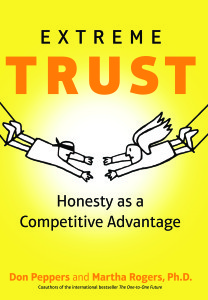 Every Thursday, I will republish my best articles from Technorati.com. Since Technorati redesigned its website and is under new managements, tens of thousands of articles that were previously published on the site are no longer available. I have been given explicit permission to republish my work on my own website.
Trust is an increasingly valuable commodity when it comes to doing business, one that some try to take advantage of with fake social media reviews and other strategies (old and new) that are meant to fool customers; however, Don Peppers and Martha Rogers Ph.D argue in their latest book it won't be long before the only successful businesses are the ones that are extremely trustworthy.
Every Thursday, I will republish my best articles from Technorati.com. Since Technorati redesigned its website and is under new managements, tens of thousands of articles that were previously published on the site are no longer available. I have been given explicit permission to republish my work on my own website.
Trust is an increasingly valuable commodity when it comes to doing business, one that some try to take advantage of with fake social media reviews and other strategies (old and new) that are meant to fool customers; however, Don Peppers and Martha Rogers Ph.D argue in their latest book it won't be long before the only successful businesses are the ones that are extremely trustworthy.
Their book, Extreme Trust: Honesty as a Competitive Advantage, says that the rising levels of transparency in society will mean that businesses will have to protect customer interests proactively. By investing in ways to preserve reputation and to build customer relationships, businesses will develop the extreme trust necessary to survive a world where the social domain and the commercial domains are constantly colliding.
"In the future, companies will have to do this because of competitive pressure," Peppers said. "If they don't do it, someone else will."
Peppers also said that the book is fundamentally about how business will change because of technology-driven innovation, and described extreme trust as the "inevitable evolution of business over the next generation or so.
We can probably think of many examples of how different companies and industries treat their customers as transactions, how they try to make money off of people instead of working with them to earn their profits. Below are some of the book's most noticeable examples:
- Banks will soon have to stop relying on overdraft charges, because so many of them are based on simple customer error.
- Credit card companies will have to coach customers on avoiding excessive borrowing.
- Cell phone providers will have to help customers find the cheapest calling plans for their usage patterns.
- Retailers will have to remind customers when a gift card or rebate card has gone unused or may be lost.
"[It's up to] companies to decide whether they understand that they have two goals now: make money this quarter, and figuring out how what they do and what they say is going to affect the long-term value of a customer," Rogers said. "Long-term value is determined today."
What makes a trustable company, versus one that will simply do what it says and follow the law? Peppers and Rogers say that a trustable company will do three things:
- Do Things Right
- Do the Right Thing
- Do the First Two Proactively
Customers would be willing to pay $11 more a month for a mobile phone company they actually trust," Rogers said. "[A trustable company will] keep you posted on what’s good for you about the business, and offer things that are valuable to you instead of making you search for everything from scratch."
Therefore, current tactics used to develop trust, such as fake social media reviews and black hat SEO techniques, only tarnishes a company's long-term ability to gain trust for a small-term (if any) financial gain. Even though falsehoods can happen (like someone spreading misinformation or even leaving a bad, yet real, negative review), doing things so well that loyal customers come to your defense is a much better way to go.
"Social media takes care of [a falsehood or negative review] by burying it with more accurate data," Rogers said. "There are simply not enough lawyers to take everything off the Internet."
"Customers want to be treated the way their friends treat them," Peppers said. "The real solution is social credibility. As long as you have cultivated a reputation in advanced for being trustable, people will value your business and mourn if you go out of business."
The book may be considered a must-read for anyone leading an organization, but it is also a must-read for any consumer who wants to be a consumer of trustable brands, and not just another transaction. The only way for extreme trust to be the way we do business in the future is for people to demand it now, and to take it away from those who make their money by taking advantage of their customers.
"There have been radical changes in the last five years. This is not a fad," Rogers said. "There will always be more interconnectedness and never less. This is the way we will have to compete."
